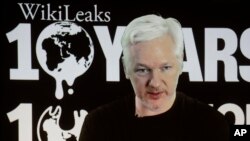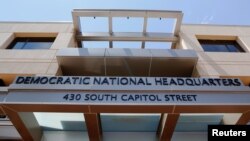Ecuador's government admitted Tuesday that it had “temporarily restricted” WikiLeaks founder Julian Assange's internet access at its London embassy after the site published documents from Hillary Clinton's U.S. presidential campaign.
A foreign ministry statement said that while it stands by its decision in 2012 to grant Assange asylum, it does not interfere in foreign elections. Leftist President Rafael Correa’s government said it was acting on its own and not ceding to foreign pressures.
The Foreign Ministry didn't specify how Assange's internet access had been restricted; it said only that the curbs wouldn't affect WikiLeaks' journalistic ability.
WikiLeaks, in tweets Tuesday morning, alleged that U.S. Secretary of State John Kerry had asked Ecuador to stop Assange from publishing documents about Democratic presidential candidate Hillary Clinton.
State Department spokesperson John Kirby categorically denied the assertion.
“While our concerns about WikiLeaks are longstanding, any suggestion that Secretary Kerry or the State Department were involved in shutting down WikiLeaks is false,” Kirby said. “Reports that Secretary Kerry had conversations with Ecuadorian officials about this are simply untrue. Period.”
WikiLeaks claimed Monday that Assange’s internet connection had been "intentionally severed by a state party."
Writing on Twitter, WikiLeaks later said it had "activated appropriate contingency plans" for Assange, who has been holed up in Ecuador's London embassy since 2012 to avoid arrest. Sweden is pressing to have the 45-year-old Australian national extradited over an alleged sex offense.
A WikiLeaks spokesman, in comments to AFP, linked the severed connection to "our ongoing publications revealing the associations and positions of U.S. presidential candidate Hillary Clinton."
The Clinton campaign reported in July that the emails of the Democratic National Committee had been hacked by Russia, and WikiLeaks later began publishing the contents of the hacked documents. Moscow has denied involvement.
The most recent batch of hacked documents included a 2013 Clinton speech to a conference of investment bankers. In the speech, she said she urged China to do what it could to control North Korea’s nuclear threat, saying “You either control them, or we’re going to have to defend against them.”
WikiLeaks also published emails purportedly linked to Clinton campaign chairman John Podesta, who said last week an FBI probe of that breach is part of a wider investigation into an alleged Russian hacking campaign ahead of November 8 elections.
Podesta also claimed that Roger Stone, a key adviser to Republican candidate Donald Trump, had advance knowledge of the leaks. That accusation follows predictions from Stone in August that WikiLeaks would attack both Clinton and Podesta in the coming weeks.
The latest WikiLeaks disclosures, focusing exclusively on the Clinton campaign, have prompted some analysts to speculate that Russia has teamed up with WikiLeaks in an attempt to subvert Clinton's presidential bid.
Despite its recent Clinton focus, WikiLeaks also has rankled the leaders of several foreign governments, key among them Turkish President Recep Tayyip Erdogan.
In July, the Turkish leader ordered a nationwide blockade of WikiLeaks' website, after the group released 300,000 emails hacked from Erdogan's ruling party.
WikiLeaks touted those emails as describing Turkey's political power structure. The release came as the Erdogan government moved to crush a domestic political uprising widely seen as an attempted military coup.






